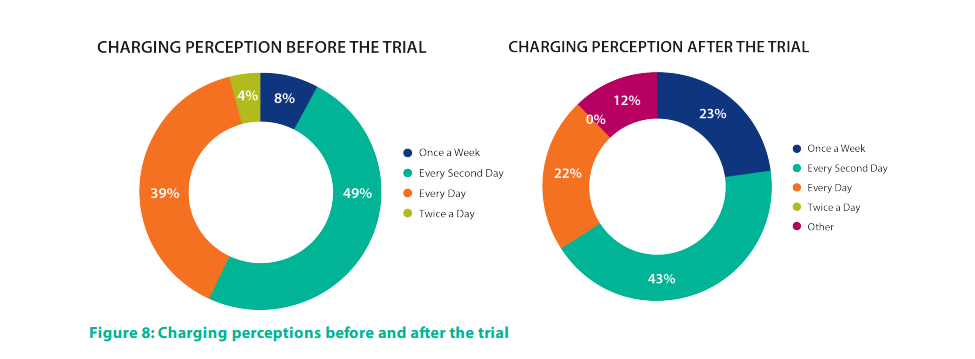10 mins read
As we have discussed previously, the Irish government has a commitment to reducing transport emissions by 51% by 2030 and ensuring that 30% of all vehicles on Irish roads are electric by the same year. As of February 2025, Electric Vehicles currently have a 15.68% Market Share in Ireland.
To support these targets, the Sustainable Energy Authority of Ireland (SEAI) launched a large-scale trial to better understand the opportunities and challenges of integrating electric vehicles (EVs) into commercial fleets. Supported by Zero Emission Vehicles Ireland (ZEVI), the trial aimed to provide businesses with direct experience of EVs while gathering crucial data on their performance, cost-effectiveness, and practicality across different industries.
Background and Purpose
The case study aimed to assess the opportunities and challenges presented by EVs for Irish businesses across various sectors. Nearly 200 participants from diverse industries such as floristry, public services, hospitality, logistics, and consulting were involved. The trial provided each participant with a loaned EV for three months at no capital cost, with only insurance expenses. Additionally, participants received a complimentary charger and up to €1,000 towards installation costs. Telematic devices were also installed on the vehicles to track distances travelled and charging cycles, while surveys conducted before and after the trial gauged business needs for and perceptions of EVs.
The Trial
Commencing in December 2022 with rolling three-month placements, the trial concluded in September 2024, involving approximately 14 vehicles in circulation at any given time.
Key Results
| Average for both | M1 Car | N1 Van | |
| Distance travelled | 3,700km | 4,400km | 2,800km |
| AC Charging Sessions | 28 | 29 | 27 |
| DC Charging Sessions | 3 | 5 | 2 |
| Tailpipe emissions avoided | 512kg | 529kg | 484kg |
| Cost savings per 10,000 km | €359* | €320 | €407 |
| Efficiency Calculated M1 (Car) | 23kwh/100km | 20kwh/100km | 29kwh/100km |
*Electricity rate 29ckWh. Fuel (petrol and diesel combined) €1.65/litre
- Charging Patterns: The majority of charging occurred on AC chargers, typically owned by the participants themselves, ensuring lower electricity costs and maximizing potential savings. It’s noteworthy that electricity prices varied significantly between early 2023 and mid-2024, affecting cost calculations. As Ireland moves towards 80% renewable energy by 2030, further emissions reductions and potentially lower energy costs are anticipated.
- Usage Across Ireland: Contrary to the perception that EVs are limited to urban environments, data from the trial indicated consistent daily usage across all regions of Ireland, with shorter journeys (0-25km) dominating daily trips. This suggests that EVs are suitable for varied geographic and operational contexts.
- Purchase Intent: Survey responses revealed a notable shift in participant attitudes towards EV adoption. Before the trial, a high percentage expressed uncertainty or reluctance to adopt EVs; however, post-trial, there was a marked increase in willingness to consider EVs for future fleet investments.
- Charging Frequency: Participant expectations regarding daily or near-daily charging decreased significantly post-trial, aligning more closely with actual telematics data that showed vehicles were typically charged every three days on average.

Conclusion
The SEAI’s EV fleet trial not only provided valuable insights into the practicality and benefits of EV adoption across diverse business sectors, but also contributed to broader efforts in meeting Ireland’s sustainable transport goals. As the country continues to advance towards a greener future, initiatives like this underscore the pivotal role of EVs in reducing emissions, enhancing operational efficiency, and shaping the future of mobility.
Are you considering adding EV’s to your fleet? Read our 7 Steps to Fleet Electrification Guide here and get in touch – our team are happy to discuss all your options for introducing EVs into your fleet.
